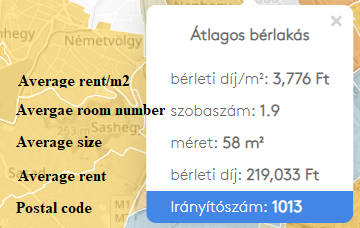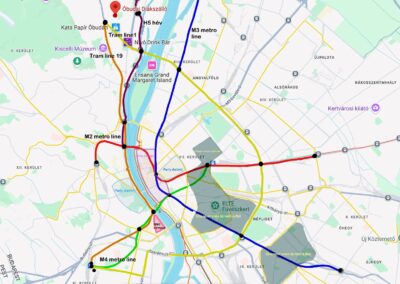Apartment and room rentals
Maps that show where it’s worth to move – relatively cheap with good public transportation.
Suggested areas
A collection of the most useful words for flat searching.
Glossary
A general guideline about what to pay attention to when signing rental agreements
Lease agreement
Groups and websites
Hungarian groups
- Albérlet Budapest
- Budapest Albérlet
- Albérlet Budapest – Tulajdonostól
- Budapest Albérlet Keresők
- Albérlet Budapest – megfizethető áron kiadó lakások
- Eladó/Kiadó Szoba és Lakás Budapest
- Budapest Kiadó Szoba
- Lakótárs, szobatárs, kiadó szoba, kiadó lakás kereső – Budapest és környéke
- Kiadó szobák és lakások albérlőknek Budapesten
- Budapesti eladó, kiadó lakások, albérletek, szobák, szobatárs kereső
English sites
Suggested areas of Budapest
These maps give you some useful information if you are planning to live in rented accommodation. Please note that we do not take responsibility for any difference you may experience.
This link will navigate you to a website that gives you the estimated rent you’ll have to pay in certain areas of Budapest

How to use it?
Click on one of the colored fields, a box will pop up with all the necessary information as shown below.
The following map shows the 4 metro lines. In terms of public transportation, using metros is usually the fastest option, so renting a flat near a metro station is highly advisable. It can also be advisable to rent a flat near the 4/6 tram, since it runs all night! Also, you can see our university and Óbudai hostel, offered by BME. The blue areas represent cheaper residential areas for accommodation renting. Click the photo to zoom in!
Hungarian-English glossary for flat search
| English | Hungarian | Definition |
| Utilities | Közműdíj | Any charge that is connected to your use of electricity, gas, water, or internet. |
| Common cost | Közös költség | A specific amount of money you need to pay the house you live in for the use of common areas, cleaning, maintenance, etc. |
| Overheads | Rezsi | The sum of utilities and common cost. |
| Deposit | Kaució | A specific amount of money you need to give your landlord as security for any damage you may cause to the property. At the end of your tenancy, it is reimbursed to you. It DOES NOT substitute your rental fee for the last couple of months. |
|
Rental agreement Lease contract |
Bérleti szerződés | An official document signed by you and the landlord stating the terms and conditions of your tenancy in your apartment. It acts as proof that you legally live at your place. |
Ingatlan.com English Guide
You can find lots of apartments and rooms for rent on Ingatlan.com, it’s the most popular real estate and rental site in Hungary.


About lease agreements
This is a collection of general information about lease agreements made by the International Mentor Team of the Budapest University of Technology and Economics. Please note that we don’t take responsibility for any lease agreement made based on this information.
Downloadable documents
Documents that might be useful to check
A template lease agreement in English and Hungarian.
Lease agreement
A template of an inventory list of an apartment.
Report of inventory
General Information
The aim of a lease agreement (rental agreement) is to ensure the rights, duties, and obligations of both the Lessor (owner) and the Lessee (tenant) in any case. So when you are about to sign a contract please think about your rights.
As you probably don’t speak Hungarian and many owners don’t speak English, the general solution for this problem is a bilingual agreement. In this case, the Lessor and the Lessee can both understand the agreement. We uploaded a general contract you can use, or compare with your Lessor’s contract to see if that one is ok. However, many Lessors have their agreements and they usually insist on using them. In this case, mentors can check your agreement and can give you advice on whether to sign it or not, but the signature of an agreement is always your responsibility.
Now let’s check the most important points of an agreement based on the uploaded one.
Lessor and Lessee
The sample agreement is an agreement between one owner and one tenant. If you will not live alone in a flat, the agreement must include all of your flatmates according to their proper status. It can be your family for example. In this case, you are the Lessee alone, and the others are the members of your family. It is also possible to rent a flat with someone else (with a friend for example). In this case, you are tenants, and both of you must be indicated as tenants/lessees.
When you sign an agreement, it is normal that the Lessor checks the Lessee’s ID/passport and address card, and copies them. Lessees can do the same as well.
Signatures
As rental issues are regulated by the Civil Code, only written and signed documents are considered in legal action. So your agreements in a word mean nothing and even e-mails and other unsigned messages related to your rental issues are not accepted as legal proof. There is one special case: a valid electronic signature. It is a special document format and it is not equal to a scanned and copy-pasted signature. Printed signatures are not valid!
Another important thing when signing a contract is to check if the other party has the right to sign it or not. Basically, the owner can sign the contract or an estate agent. But the agent must have an authorisation from the owner that s(he) can sign the contract, and you need to get an original version of it. It is also advised that all of the sheets of the contract will be signed by the Lessor and the Lessee on both sides.
To verify the owner of the flat, you can ask for a Property deed (in Hungarian: Tulajdoni lap), which is not older than 30 days. Now, owners can request it online as well. In this sample agreement, it is marked as an appendix, however, it is not so important to be marked in the agreement, but you must get one.
Document for the Immigration Office
The required document is a signed Accommodation reporting form. We suggest that you take one with you when you go to sign a contract, so you don’t have to bother the owner twice. You can find further info on the immigration office at this link.
Report of inventory
This is the second appendix of the sample agreement. We uploaded a sample Report of inventory as well (source: alberlet.hu). It doesn’t have to be an appendix, the agreement can also include this information. The sample inventory includes 2 kinds of information:
- Appointments (furniture and anything else you can find in the flat that belongs to the owner). This list mostly protects the owner, however, some owners just don’t care about it and they don’t insist on defining the appointments in the agreement. You don’t have to insist on it either, but you should always take pictures of the flat when you move in, so you have proof of the original state of the flat.
- Meters. There are different meters (the equipment, which measures the consumption) in all of the flats. These are usually the electricity meter, the water meter, and the gas meter (and/or the heating meter). It is really important to read the meters when you move in and write the values to the agreement or an appendix, because this ensures that you will have to pay only for your consumption, not for one of the former tenant’s as well.
Rental fee and security deposit
The security deposit is usually equal to 2 months’ rental fee, however, on rare occasions owners ask for 3 months’ rental fee as a deposit (especially from foreign people). Lessee usually has to pay the deposit and the first month’s rental fee in cash simultaneously with the signature of the agreement. It is important, that the agreement must contain this transaction. In some cases, owners prefer to make a different document about this transaction. It is not so common, but it is acceptable as well.
In the sample agreement, Lessee pays the rental fee by money transfer. Some owners prefer cash. It is okay too, but it must be specified in the agreement, and you need to get proof of your payment every time. It can be a receipt or a proof of receipt.
The agreement must specify Lessee’s other costs too. These overheads are the common costs and the utilities. There are several options here as well:
- The rental fee contains everything.
- The rental fee has 2 parts: a rental fee and a general overheads fee. In this case, Lessor and Lessee compare the overheads fee part with the exact amount of overheads (based on bills) from time to time and they pay the difference to each other.
- The rental fee is just a rental fee and the Lessor pays the bills. In this case, Lessee sends the cost of bills with the rental fee.
- Lessee pays the bills.
Please note, that it is possible that you pay a lump sum after some of your consumption. It means that you pay the same amount of money every month based on your consumption of the previous year. From time to time the provider (gas company, water company…) compares your consumption with the amount you paid and you have to pay the difference to each other. After a cold winter, it could mean that you have to pay tens of thousands HUFs extra gas fee.
The agreement must also contain how the Lessee will get the deposit back with the termination of the agreement.
Witnesses
An agreement is valid without witnesses, however, an agreement with 2 witnesses is much stronger. Witnesses are not responsible for the content of agreements, they just certify that the parties (Lessor and Lessee) signed the contract in front of them.
When you terminate a lease agreement it is important to get a signed document about it too. It must contain that the owner checked the flat, found it okay, the bills are paid and you got your security deposit back.
Special cases/FAQ (click here!)
- We are renting a flat together. I decide to move out. Do the others have to pay my part of the rental fee too?
It depends on your agreement. The most common case is that the owner signs one contract with all of the tenants, in which you agree that tenants will pay the whole rental fee together. In this case yes, the whole rental fee of the flat must be paid every month in any case. However, if the Lessor has individual rental agreements with all of the Lessees, everyone has to pay according to his/her own contract regardless of any action.
- How can I terminate a fixed-term agreement earlier?
If you have a fixed-term agreement, but you would like to quit earlier, you can do by mutual consent or by extraordinary notice. In mutual consent Lessor and Lessee can agree anyhow, but Lessors are usually not so motivated in it. In case of an extraordinary notice, Lessee must give a signed copy of his/her notice to Lessor. After the lessor got it, there is a period of notice, which is usually 30 days but it can be different according to the agreement. For this period Lessee must pay the rental fee. In addition, Lessor gets the security deposit as well.

